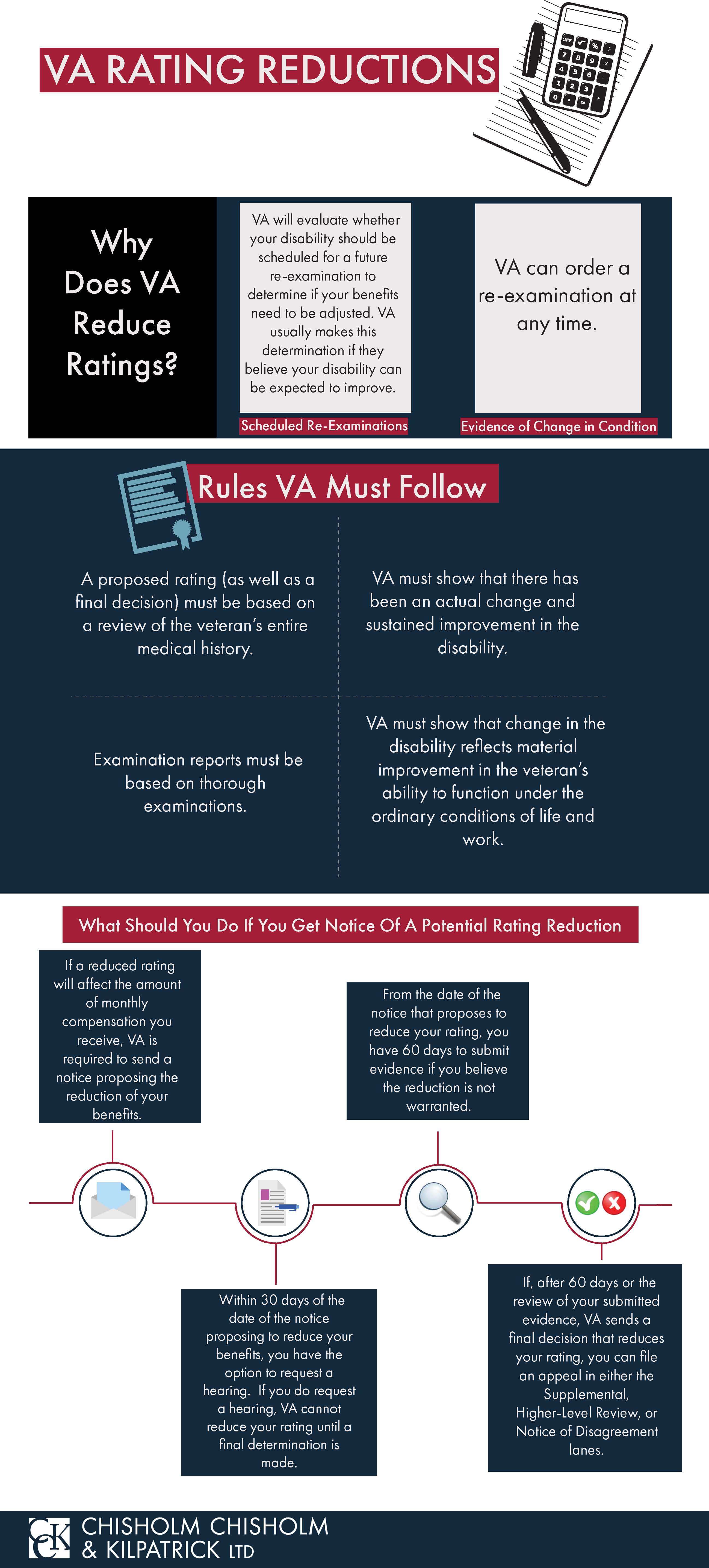How Often Does VA Reevaluate Disability Ratings?

CCK Law: Our Vital Role in Veterans Law
What is a VA Re-Examination and Reevaluation?
A VA re-examination is a medical examination used to reevaluate the severity of your service-connected disability. After you are initially awarded disability benefits, VA will evaluate whether your disability is such that you ought to be scheduled for a future re-examination to determine if your benefits need to be adjusted. The types of service-connected disabilities that are most likely subject to reevaluation include those that can be expected to improve over time. VA is required to send you advance notice of the need for a re-examination. It is very important for you to show up for this examination. If you fail to attend, and do not call to reschedule or explain why you are unable to make it, then it is likely that VA will reduce or terminate your disability benefits.
When Does VA Reevaluate Your Service-Connected Disability?
VA usually reevaluates veterans’ service-connected disabilities on two occasions:
- Six months after leaving military service; and
- Between two and five years from the date of the decision to grant VA disability benefits.
The purpose of reevaluation is to verify either the continued existence and/or the current severity of a service-connected condition. VA will also require reevaluation in cases where it is likely that a veteran’s disability has improved, such that there is evidence indicating there has been a material change in a disability or that the current rating percentage is incorrect. If there is a significant improvement to the veteran’s health, VA may choose to assign a lower disability rating, thereby lowering the amount of monthly compensation the veteran receives. VA may also determine that a disease or disability no longer exists, and discontinue benefits. Cancer is a common example of a service-connected disability that requires reevaluation as the result of material improvement. Specifically, if a veteran’s service-connected cancer goes into remission, it is likely that VA will reevaluate the condition and assign a new disability rating based on any residuals. However, if VA decreases your benefits based on the reevaluation of your condition, you have the right to request an increase if your condition worsens again.

VA Rating Reductions
Under certain conditions, VA may reduce your disability rating. However, there are specific rules VA must follow when issuing rating reductions. A proposed rating reduction (as well as a final decision) must be based on a review of the veteran’s entire medical history. VA must show that there has been an actual change in the disability since the last Rating Decision, and that such a change reflects material improvement in the veteran’s ability to function under the ordinary conditions and stressors of life and work.
What Happens If You Receive Notice of a Proposed Rating Reduction?
VA is required to send a letter proposing the reduction of your benefits if the decrease will affect the amount of monthly compensation you receive. The letter is not a final VA decision, so it cannot be appealed, but VA is required to give you the opportunity to respond to the proposal by submitting evidence and/or attending a hearing. From the date of VA’s letter, you have 60 days to submit evidence if you believe the reduction is not warranted. Within the first 30 days of the 60-day period, you also have the option to request a hearing to be conducted by VA personnel unrelated to the proposed reduction. VA must consider evidence you submit during this period along with all previous evidence and medical records associated with your file.
When Are Veterans Protected from Reevaluations and Rating Reductions?
Typically, VA will not reevaluate or re-schedule a re-examination for your service-connected disability under the following conditions, however, there may be exceptions on a case-by-case basis:
- You are over the age of 55.
- You have a stabilized rating (5 years or more). Any rating that has remained at the same level for 5 years or longer is considered “stabilized.” In order to reevaluate stabilized ratings, VA must show sustained improvement. VA cannot use just one re-examination to show sustained improvement. Rather, it must show through medical records as well as the re-examination that you are not just temporarily experiencing improvement. Or, VA must show that the evidence in your file predominantly demonstrates sustained improvement.
- You have a total disability rating (100%). VA can reevaluate and reduce a total rating if there is evidence of material improvement in your condition. Here, VA must provide evidence that your condition has improved such that there has been an observable change in your ability to function under the conditions of daily life.
- You have a permanent disability. If you have a disability that is considered permanent in nature, this means that VA is reasonably certain, based on medical evidence, that the level of impairment will continue for the rest of your life with zero or close to zero chance of improvement.
- You have a continuous rating for 20 years or more. Conditions that have been rated at or above a certain rating level for 20 years or more are considered “continuous”. VA cannot reevaluate or reduce a continuous rating below the original level it was assigned.
About the Author
Share this Post

